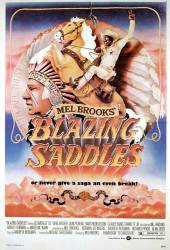Visible crew/equipment: When Bart enters the saloon to deliver the candygram to Mongo, his shadow can clearly be seen against the painted backdrop behind him depicting the street scene. (00:47:45)

Blazing Saddles (1974)
Plot summary
Directed by: Mel Brooks
Starring: Gene Wilder, Mel Brooks, Slim Pickens, Cleavon Little, Harvey Korman
The movie is nominally a western (and apparently the highest grossing Western ever, would you believe.
Hedley Lamarr ("..That’s Hedley" – a joke that many of us younger folks won’t understand anymore – apparently, there used to be a silent film star (female) called Heddy Lamarr. She sued. Mel Brooks settled out of court), the State Procurer/Attorney General/Assistant to the Governor, played by Harvey Korman, is keen to build a railroad. The problem is, he wants to build it through the town of Rock Ridge (entirely populated by people who’s last name is Johnson. There’s even a Howard). Needless to say, the townspeople, who all own their own land, would, at the least object, and if not, demand large amounts of money for their land.
A dastardly scheme is dreamt up in order to scare the townspeople away. The townspeople complain to (the rather simple) Governor William J. LePetomane (Mel Brooks), asking for a sheriff to protect them. Lamarr figures that the best way to solve THAT problem is to hire a sheriff that the townspeople wouldn’t accept for, well, all the tea in China. He’s black, played by Cleavon Little.
Bart (for that is the sheriff’s name) has a difficult start in Rock Ridge. Fortunately, he is befriended by Jim, the Waco Kid (Gene Wilder). Between them, they set out to save the town of Rock Ridge, despite the obstacles placed in the way by Lamarr and his cronies.
That is, really, the plot in a nutshell. Everything does come right in the end, with Bart and Jim riding (then subsequently driving) into the sunset.
Mark Hampson
Bart: Well, can't you see that's the last act of a desperate man?
Howard Johnson: We don't care if it's the first act of "Henry V, " we're leaving!
Question: At the beginning, Lyle refers to the song Camptown races as "The Camptown lady"? Is this simply cause he's stupid, or is there any other reason?
Join the mailing list
Separate from membership, this is to get updates about mistakes in recent releases. Addresses are not passed on to any third party, and are used solely for direct communication from this site. You can unsubscribe at any time.
Check out the mistake & trivia books, on Kindle and in paperback.




Chosen answer: The opening line of the song refers to the Camptown Ladies and the phrase "Camptown Races" never appears anywhere in the lyrics. If nobody told him otherwise, Lyle may simply have assumed that some variation on "Camptown Ladies" was the actual title.
Tailkinker ★
The actual title of the song was "Gwine to Run All Night, or De Camptown Races," written by American lyricist Stephen Foster and first published in 1850. Over many years on the minstrel show circuit, the title was shortened to "Camptown Races" and was sometimes erroneously called "Camptown Ladies." While the phrase "Camptown Races" doesn't appear in the lyrics, the phrase "Camptown Racetrack" does appear in the second line: "Camptown ladies sing dis song, doo-dah, doo-dah, Camptown Racetrack five miles long, oh-de-doo-dah-day." The song refers to Camptown, Pennsylvania, a real town with a popular horserace in the mid-1800s.
Charles Austin Miller